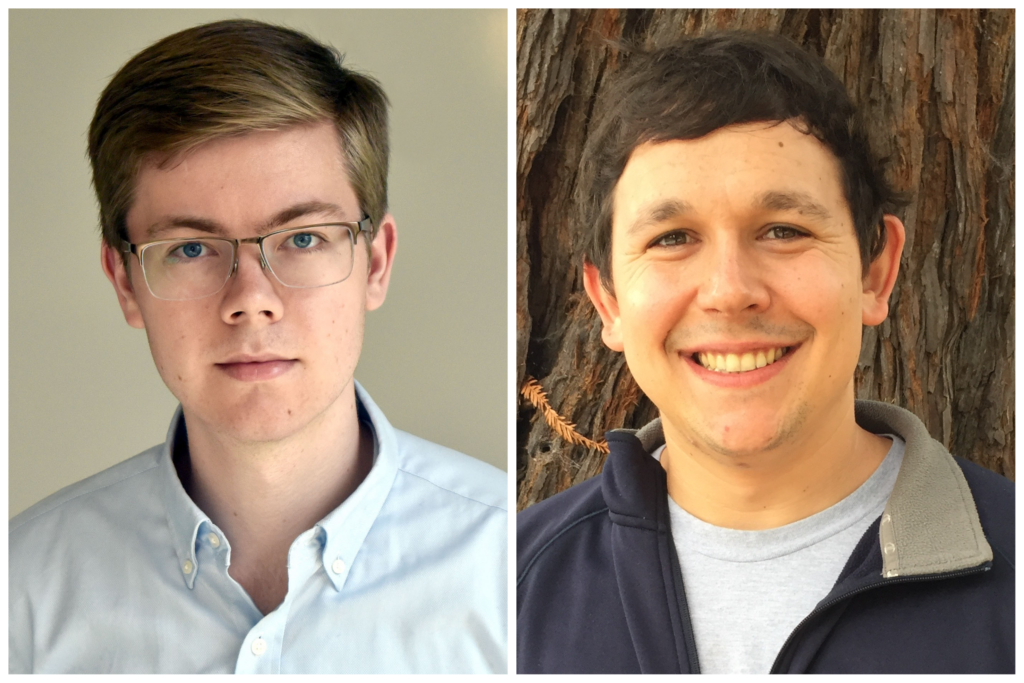Connor Coley, Dylan Hadfield-Menell named AI2050 Early Career Fellows
 Left: Connor Coley. Right: Dylan Hadfield-Menell. Photos courtesy of their subjects.
Left: Connor Coley. Right: Dylan Hadfield-Menell. Photos courtesy of their subjects. Department of EECS Assistant Professors Connor Coley and Dylan Hadfield-Menell have been named to the inaugural cohort of AI2050 Early Career Fellows by Schmidt Futures, a philanthropic initiative from Eric and Wendy Schmidt aimed at helping to solve hard problems in AI.
Connor W. Coley is an Assistant Professor at MIT in the Department of Chemical Engineering and the Department of Electrical Engineering and Computer Science. He received his B.S. and Ph.D. in Chemical Engineering from Caltech and MIT, respectively, and did his postdoctoral training at the Broad Institute. His research group at MIT develops new methods at the intersection of data science, chemistry, and laboratory automation to streamline discovery in the chemical sciences with an emphasis on therapeutic discovery. Key research areas in the group include the design of new neural models for representation learning on molecules, data-driven synthesis planning, in silico strategies for predicting the outcomes of organic reactions, model-guided Bayesian optimization, and de novo molecular generation. Besides the AI2050 Early Career Fellowship, Connor is a recipient of C&EN’s “Talented Twelve” award, Forbes Magazine’s “30 Under 30” for Healthcare, the NSF CAREER award, the Bayer Early Excellence in Science Award.
Dylan Hadfield-Menell is an Assistant Professor in the Department of Electrical Engineering and Computer Science. His research focuses on the problem of agent alignment: the challenge of identifying algorithmic solutions to alignment problems that arise from groups of AI systems, principal-agent pairs (i.e., human-robot teams), and societal oversight of ML systems. He aims to develop frameworks that account for uncertainty about the objective being optimized. Dylan earned his PhD from the University of California Berkeley and his undergraduate degree from MIT; besides the AI2050 Early Career Fellowship, he is a recipient of the Berkeley Fellowship, the NSF Graduate Research Fellowship, and the C.V. Ramamoorthy Distinguished Research Award.
Conceived and co-chaired by Eric Schmidt and James Manyika, AI2050 stems in part from issues raised in the bestselling book, The Age of AI: And our Human Future, co-authored by Schmidt, Henry Kissinger, and Schwarzman College of Computing Dean Dan Huttenlocher. The program will build upon and amplify Schmidt Futures’ efforts totaling $400 million to support outstanding talent working with AI and other modern tools to solve hard problems in science and society.
Media Inquiries
Journalists seeking information about EECS, or interviews with EECS faculty members, should email eecs-communications@mit.edu.
Please note: The EECS Communications Office only handles media inquiries related to MIT’s Department of Electrical Engineering & Computer Science. Please visit other school, department, laboratory, or center websites to locate their dedicated media-relations teams.